

Free French Lessons - Learn French at About - How to Speak French - Learn, Speak, Teach French. Antonyme (Gegenteile) - Fremdwörter von niedertracht. Siebenbürgisch-Sächsisch. Ehemaliges Verbreitungsgebiet des Sächsischen in Süd- und Nordsiebenbürgen.
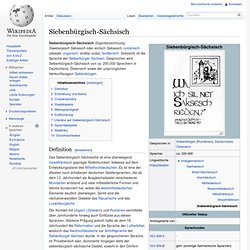
Im Westen und Nordwesten Rumäniens (Banat, Sathmar) wurde Donau-Schwäbisch gesprochen Das Vater-unser auf Siebenbürgisch Sächsisch (1666) Siebenbürgisch-Sächsisch (Eigenbezeichnung: Siweberjesch Såksesch oder einfach Såksesch, rumänisch: săsește, ungarisch: erdélyi szász, landlerisch: Soksisch) ist die Sprache der Siebenbürger Sachsen. Gesprochen wird Siebenbürgisch-Sächsisch von ca. 200.000 Sprechern in Deutschland, Österreich sowie der ursprünglichen Herkunftsregion Siebenbürgen.
Shelta. Linguistically Shelta is today seen as a mixed language that stems from a community of travelling people in Ireland that was originally predominantly Irish-speaking.
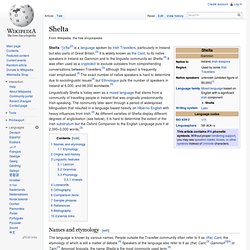
The community later went through a period of widespread bilingualism that resulted in a language based heavily on Hiberno-English with heavy influences from Irish.[4] As different varieties of Shelta display different degrees of anglicisation (see below), it is hard to determine the extent of the Irish substratum but the Oxford Companion to the English Language puts it at 2,000–3,000 words.[3] Names and etymology[edit] IPA for Irish. Pronounced names and words ordered by category. Occitan language. Occitan (English pronunciation: /ˈɒksɨtən, -tæn, -tɑːn/;[8][9] Occitan: [utsiˈta];[10] French: [ɔksitɑ̃]), also known as lenga d'òc (Occitan: [ˈleŋɡɔ ˈðɔ(k)]; French: langue d'oc) by its native speakers, is a Romance language.
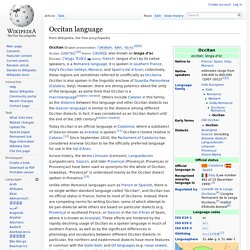
It is spoken in southern France, Italy's Occitan Valleys, Monaco, and Spain's Val d'Aran; collectively, these regions are sometimes referred to unofficially as Occitania. Thus Spoke Zarathustra. Thus Spoke Zarathustra: A Book for All and None (German: Also sprach Zarathustra: Ein Buch für Alle und Keinen, also translated as Thus Spake Zarathustra) is a philosophical novel by German philosopher Friedrich Nietzsche, composed in four parts between 1883 and 1885. Much of the work deals with ideas such as the "eternal recurrence of the same", the parable on the "death of God", and the "prophecy" of the Übermensch, which were first introduced in The Gay Science.[1] Origins[edit] Thus Spoke Zarathustra was conceived while Nietzsche was writing The Gay Science; he made a small note, reading "6,000 feet beyond man and time," as evidence of this.[2] More specifically, this note related to the concept of the eternal recurrence, which is, by Nietzsche's admission, the central idea of Zarathustra; this idea occurred to him by a "pyramidal block of stone" on the shores of Lake Silvaplana in the Upper Engadine, a high alpine region whose valley floor is at 6,000 ft.
Synopsis[edit] Themes[edit] Syriac language. Syriac (ܠܫܢܐ ܣܘܪܝܝܐ Leššānā Suryāyā) is a dialect of Middle Aramaic that was once spoken across much of the Fertile Crescent and Eastern Arabia.[2][3][4] Having first appeared as a script in the 1st century AD after being spoken as an unwritten language for five centuries,[5] Classical Syriac became a major literary language throughout the Middle East from the 4th to the 8th centuries,[6] the classical language of Edessa, preserved in a large body of Syriac literature.
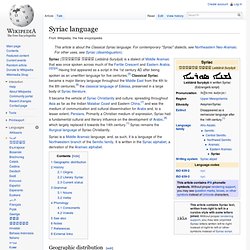
It became the vehicle of Syriac Christianity and culture, spreading throughout Asia as far as the Indian Malabar Coast and Eastern China,[7] and was the medium of communication and cultural dissemination for Arabs and, to a lesser extent, Persians. Primarily a Christian medium of expression, Syriac had a fundamental cultural and literary influence on the development of Arabic,[8] which largely replaced it towards the 14th century.[1] Syriac remains the liturgical language of Syriac Christianity.
History[edit] Boston accent. The Boston accent is the regional accent or sub-dialect of New England English spoken in the city of Boston and much of eastern Massachusetts.
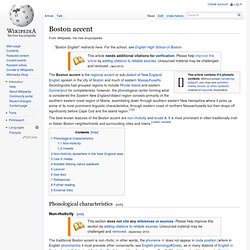
Sociolinguists had grouped regions to include Rhode Island and eastern Connecticut for completeness; however, the phonological center forming what is considered the Eastern New England dialect region consists primarily of the southern eastern coast region of Maine, assimilating down through southern eastern New Hampshire where it picks up some of its most prominent linguistic characteristics, through eastern coast of northern Massachusetts but then drops off significantly before Cape Cod and the island region.[1][2] The best-known features of the Boston accent are non-rhoticity and broad A.
It is most prominent in often traditionally Irish or Italian Boston neighborhoods and surrounding cities and towns. Institut - Gemeinsamer europäischer Referenzrahmen für Sprachen. 3.3 Beschreibung der Gemeinsamen Referenzniveaus Die Einrichtung eines Systems gemeinsamer Referenzpunkte schränkt in keiner Weise ein, wie verschiedene Bildungssektoren mit unterschiedlicher didaktischer Tradition ihr eigenes System von Niveaus und Modulen organisieren und beschreiben.
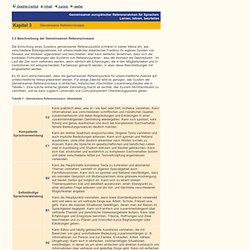
Man kann weiterhin annehmen, dass sich die konkreten Formulierungen des Systems von Referenzpunkten - also der Wortlaut der Deskriptoren - im Lauf der Zeit noch verfeinern werden, wenn nämlich die Erfahrungen, die in den Mitgliedstaaten und in Institutionen mit entsprechendem Fachwissen gemacht werden, in eben diese Beschreibungen mit eingearbeitet werden. Es ist auch wünschenswert, dass die gemeinsamen Referenzpunkte für unterschiedliche Zwecke auf unterschiedliche Weise präsentiert werden. Für einige Zwecke wird es genügen, das System der Gemeinsamen Referenzniveaus in einfachen, holistischen Abschnitten zusammenzufassen wie in Tabelle 1.
Predator - The Hunted: Yautja. Predator culture in general is based on the concept of The Hunt. Whereas humans on earth were agrarian, the Predators never stayed in just one place. Their culture revolves around the concept of hunting and stalking prey. Very similar to a pack mentality, the strongest and most efficient member of the Clan is the leader. Dictionary of Irish Terms - Foclóir Téarmaíochta. List of Latin phrases (E) This page lists English translations of notable Latin phrases, such as veni vidi vici and et cetera.
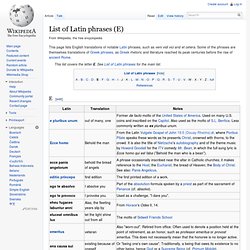
Some of the phrases are themselves translations of Greek phrases, as Greek rhetoric and literature reached its peak centuries before the rise of ancient Rome. This list covers the letter E. List of Greek phrases. From Wikipedia, the free encyclopedia Αα[edit] (h)a ἀγεωμέτρητος μηδεὶς εἰσίτω Ageōmétrētos mēdeìs eisítō.
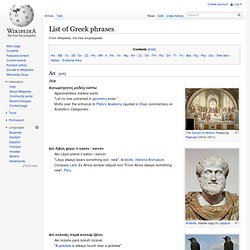
§ 330 ZPO Versäumnisurteil gegen den Kläger. Cyrillic alphabet. Distribution of the Cyrillic script worldwide.
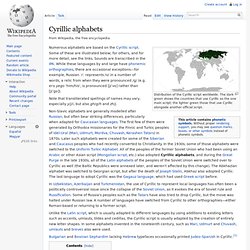
The dark green shows the countries that use Cyrillic as the one main script; the lighter green those that use Cyrillic alongside another official script. Numerous alphabets are based on the Cyrillic script. Some of these are illustrated below; for others, and for more detail, see the links. Sounds are transcribed in the IPA. While these languages by and large have phonemic orthographies, there are occasional exceptions—for example, Russian 〈г〉 represents /v/ in a number of words, a relic from when they were pronounced /ɡ/ (e.g. его yego 'him/his', is pronounced [jɪˈvo] rather than [jɪˈɡo]).
Note that transliterated spellings of names may vary, especially y/j/i, but also gh/g/h and zh/j. Non-Slavic alphabets are generally modelled after Russian, but often bear striking differences, particularly when adapted for Caucasian languages. Bulgarian and Bosnian Sephardim lacking Hebrew typefaces occasionally printed Judeo-Spanish in Cyrillic.[1] Notes: Malapropism. The word malapropism comes ultimately from the French mal à propos meaning "inappropriate" via "Mrs.
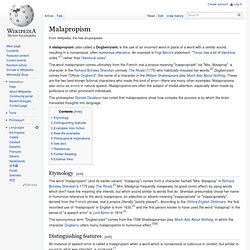
Malaprop", a character in the Richard Brinsley Sheridan comedy The Rivals (1775) who habitually misused her words.[2] Dogberryism comes from "Officer Dogberry", the name of a character in the William Shakespeare play Much Ado About Nothing. These are the two best-known fictional characters who made this kind of error—there are many other examples. Malapropisms also occur as errors in natural speech. Malapropisms are often the subject of media attention, especially when made by politicians or other prominent individuals.
Etymology[edit] The word "malapropism" (and its earlier variant, "malaprop") comes from a character named "Mrs. SYSTRAN - Online translation, translation software and tools. Romanization of Japanese. The romanization of Japanese is the application of the Latin script to write the Japanese language. This method of writing is sometimes referred to in English as rōmaji (ローマ字? , literally, "roman letters") (Japanese pronunciation: [ɽóːmadʑi] listen ), less strictly transcribed romaji, sometimes incorrectly transliterated as romanji or rōmanji. There are several different romanization systems. The Lord's Prayer in different languages - Search results. The O'Byrne Files © collection of Irish Expressions and their meaning in English. Language Irish culture and customs - World Cultures European.
English Grammar rules and teaching ideas. Famous Latin quotations, translations, phrases, latin to english, quotes, sayings, US Armed Forces mottos. Hyphen. Punctuation mark used to join words Although hyphens are not to be confused with en dashes and minus signs, there are some overlaps in usage (in which either a hyphen or an en dash may be acceptable, depending on user preference; discussed below) and in character encoding (which often uses the same character, called a "hyphen-minus", to represent both the hyphen and the minus sign entities; discussed below).